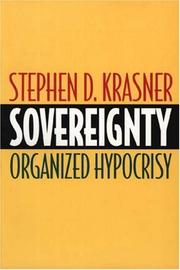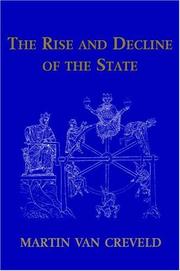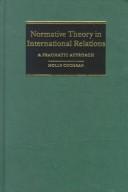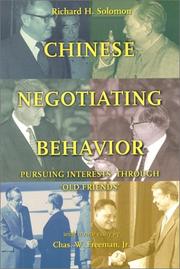| Listing 1 - 8 of 8 |
Sort by
|

ISBN: 0198781962 9780198781967 Year: 1999 Publisher: Oxford: Oxford university press,
Abstract | Keywords | Export | Availability | Bookmark
 Loading...
Loading...Choose an application
- Reference Manager
- EndNote
- RefWorks (Direct export to RefWorks)
International relations. Foreign policy --- International relations --- Philosophy --- 814 Theorie van de internationale betrekkingen --- #A0212PC --- Coexistence --- Foreign affairs --- Foreign policy --- Foreign relations --- Global governance --- Interdependence of nations --- International affairs --- Peaceful coexistence --- World order --- National security --- Sovereignty --- World politics --- International relations - Philosophy

ISBN: 069100711X 0691007020 1400812429 9786612753848 1282753843 1400823269 9780691007021 9781400823260 9780691007113 Year: 1999 Publisher: Princeton, NJ
Abstract | Keywords | Export | Availability | Bookmark
 Loading...
Loading...Choose an application
- Reference Manager
- EndNote
- RefWorks (Direct export to RefWorks)
The acceptance of human rights and minority rights, the increasing role of international financial institutions, and globalization have led many observers to question the continued viability of the sovereign state. Here a leading expert challenges this conclusion. Stephen Krasner contends that states have never been as sovereign as some have supposed. Throughout history, rulers have been motivated by a desire to stay in power, not by some abstract adherence to international principles. Organized hypocrisy--the presence of longstanding norms that are frequently violated--has been an enduring attribute of international relations. Political leaders have usually but not always honored international legal sovereignty, the principle that international recognition should be accorded only to juridically independent sovereign states, while treating Westphalian sovereignty, the principle that states have the right to exclude external authority from their own territory, in a much more provisional way. In some instances violations of the principles of sovereignty have been coercive, as in the imposition of minority rights on newly created states after the First World War or the successor states of Yugoslavia after 1990; at other times cooperative, as in the European Human Rights regime or conditionality agreements with the International Monetary Fund. The author looks at various issues areas to make his argument: minority rights, human rights, sovereign lending, and state creation in the nineteenth and twentieth centuries. Differences in national power and interests, he concludes, not international norms, continue to be the most powerful explanation for the behavior of states.
Sovereignty. --- #SBIB:327.1H10 --- #SBIB:324H20 --- 814 Theorie van de internationale betrekkingen --- Sovereignty --- State sovereignty (International relations) --- International law --- Political science --- Common heritage of mankind (International law) --- International relations --- Self-determination, National --- Internationale betrekkingen: theorieën --- Politologie: theorieën (democratie, comparatieve studieën….) --- Law and legislation --- Souveraineté --- Treaties, International

ISBN: 0521559103 052155117X 0511173113 0511039611 0511303246 0511152086 0511815611 1280416947 0511053231 1107112745 9780511039614 9780521551175 9780511815614 9780521559102 9781280416941 9780511173110 9780511152085 9780511303241 9780511053238 Year: 1999 Publisher: United Kingdom ; New York : Cambridge University Press,
Abstract | Keywords | Export | Availability | Bookmark
 Loading...
Loading...Choose an application
- Reference Manager
- EndNote
- RefWorks (Direct export to RefWorks)
Georges Sorel's Reflections on Violence is one of the most controversial books of the twentieth century: J. B. Priestley argued that if one could grasp why a retired civil servant had written such a book then the modern age could be understood. It heralded the political turmoil of the decades that were to follow its publication and provided inspiration for Marxists and Fascists alike. Developing the ideas of violence, myth and the general strike, Sorel celebrates the heroic action of the proletariat as a means of saving the modern world from decadence and of re-invigorating the capitalist spirit of a timid bourgeoisie. This edition of Sorel's classic text is accompanied by an editor's introduction by Jeremy Jennings, a leading scholar of political thought, both setting the work in its context and explaining its major themes. A chronology of Sorel's life and a list of further reading are included.
Social conflict --- Strikes and lockouts --- Syndicalism --- Violence --- 814 Theorie van de internationale betrekkingen --- Violent behavior --- Combinations of labor --- Lockouts --- Work stoppages --- Class conflict --- Class struggle --- Conflict, Social --- Social tensions --- Syndicalism. --- Strikes and lockouts. --- Social conflict. --- Violence. --- Social psychology --- Interpersonal conflict --- Sociology --- Direct action --- Labor disputes --- Strikebreakers --- Social movements --- Labor unions --- Social Sciences --- Political Science

ISBN: 1107111331 0511016689 051111771X 0511324421 1280154500 0511148992 0511497598 0511048157 9780511016684 9780511117718 9780521656290 052165629X 9780521651905 0521651905 9780511497599 9780511324420 Year: 1999 Publisher: Cambridge [England] ; New York : Cambridge University Press,
Abstract | Keywords | Export | Availability | Bookmark
 Loading...
Loading...Choose an application
- Reference Manager
- EndNote
- RefWorks (Direct export to RefWorks)
The state, which since the middle of the seventeenth century has been the most important and most characteristic of all modern institutions, is in decline. From Western Europe to Africa, many existing states are either combining into larger communities or falling apart. Many of their functions are being taken over by a variety of organizations which, whatever their precise nature, are not states. In this unique volume Martin van Creveld traces the story of the state from its beginnings to the present. Starting with the simplest political organizations that ever existed, he guides the reader through the origins of the state, its development, its apotheosis during the two World Wars, and its spread from its original home in Western Europe to cover the globe. In doing so, he provides a fascinating history of government from its origins to the present day.
State, The. --- World politics. --- Colonialism --- Global politics --- International politics --- Political history --- Political science --- World history --- Eastern question --- Geopolitics --- International organization --- International relations --- Administration --- Commonwealth, The --- Sovereignty --- State, The --- World politics --- 814 Theorie van de internationale betrekkingen --- 841 Politiek bestel --- Etat --- Politique mondiale --- Arts and Humanities --- History --- Relations internationales --- Histoire

ISBN: 0521639654 Year: 1999 Volume: 68 Publisher: Cambridge New York Melbourne Cambridge University Press
Abstract | Keywords | Export | Availability | Bookmark
 Loading...
Loading...Choose an application
- Reference Manager
- EndNote
- RefWorks (Direct export to RefWorks)
Molly Cochran offers an account of the development of normative theory in international relations over the past two decades. In particular, she analyses the tensions between cosmopolitan and communitarian approaches to international ethics and offers an argument for a pragmatist approach.
814 Theorie van de internationale betrekkingen --- #SBIB:327.1H10 --- Internationale betrekkingen: theorieën --- International relations --- Normativity (Ethics). --- Pragmatism. --- Moral and ethical aspects. --- Philosophy. --- Morale -- Norme --- Morale normative --- Normativiteit (Ethiek) --- Normativity (Ethics) --- Normativité (Ethique) --- Normativité morale --- Normativité éthique --- Norme (Morale) --- Norme morale --- Norme éthique --- Normes (Morale) --- Normes morales --- Normes éthiques --- Règle (Morale) --- Règle morale --- Règles (Morale) --- Règles morales --- Éthique normative --- Moral and ethical aspects --- Pragmatism --- Idealism --- Knowledge, Theory of --- Philosophy --- Philosophy, Modern --- Positivism --- Realism --- Utilitarianism --- Experience --- Reality --- Truth --- Ethical norms --- Normativeness (Ethics) --- Ethics

ISBN: 9780521469609 9780521465571 0521465575 0521469600 9780511612183 1107263719 0511004176 0511612184 0511052995 9780511004179 0511037759 9780511037757 9780511052996 Year: 1999 Volume: 67 Publisher: Cambridge : Cambridge University Press,
Abstract | Keywords | Export | Availability | Bookmark
 Loading...
Loading...Choose an application
- Reference Manager
- EndNote
- RefWorks (Direct export to RefWorks)
Drawing upon philosophy and social theory, Social Theory of International Politics develops a theory of the international system as a social construction. Alexander Wendt clarifies the central claims of the constructivist approach, presenting a structural and idealist worldview which contrasts with the individualism and materialism which underpins much mainstream international relations theory. He builds a cultural theory of international politics, which takes whether states view each other as enemies, rivals or friends as a fundamental determinant. Wendt characterises these roles as 'cultures of anarchy', described as Hobbesian, Lockean and Kantian respectively. These cultures are shared ideas which help shape state interests and capabilities, and generate tendencies in the international system. The book describes four factors which can drive structural change from one culture to another - interdependence, common fate, homogenization, and self-restraint - and examines the effects of capitalism and democracy in the emergence of a Kantian culture in the West.
International relations --- Sociological aspects --- Philosophy --- Philosophy. --- Sociological aspects. --- International relations. Foreign policy --- Sociological theories --- #SBIB:001.AANKOOP --- #SBIB:327.1H10 --- 814 Theorie van de internationale betrekkingen --- Coexistence --- Foreign affairs --- Foreign policy --- Foreign relations --- Global governance --- Interdependence of nations --- International affairs --- Peaceful coexistence --- World order --- National security --- Sovereignty --- World politics --- Internationale betrekkingen: theorieën --- Relations internationales --- Social aspects --- Aspect social --- Philosophie --- Sociologische theorieën --- Internationale politiek. Buitenlandse politiek --- Social Sciences --- Political Science --- International relations - Sociological aspects --- International relations - Philosophy

ISBN: 1878379860 Year: 1999 Publisher: Washington, D. C. United States Institute of peace Press
Abstract | Keywords | Export | Availability | Bookmark
 Loading...
Loading...Choose an application
- Reference Manager
- EndNote
- RefWorks (Direct export to RefWorks)
Een carrièrediplomaat en een officier uit de Foreign Service geven een historisch overzicht van de Amerikaanse ervaringen in de relaties met China zoals die sinds de ping-pongdiplomatie aan het begin van de jaren zeventig gestalte kregen. De studie, uitgevoerd voor de invloedrijke conservatieve RAND Corporation mocht eerst niet openbaar gemaakt worden omdat er uitvoerig gebruik gemaakt werd van officiële onderhandelingsverslagen, maar werd uiteindelijk toch vrijgegeven. Erg opzienbarend zijn de gegevens echter niet maar ze tonen wel goed aan hoe de VS-diplomaten en onderhandelaars de Chinese onderhandelingsvaardigen flink onderschat hadden. De passages waarin de frustratie daarover beschreven wordt, zijn wel leuk om lezen maar het geheel heeft eerder iets van een handleiding in verkoopstechnieken dan van een historisch werk.
820 Internationale betrekkingen --- 883.2 Oost-Azië --- #SBIB:012.AANKOOP --- #SBIB:327.6H00 --- #SBIB:328H52 --- Internationale en diplomatieke relaties: algemeen --- Instellingen en beleid: China --- Négociation --- Negotiation --- Political culture --- Political psychology --- Mass political behavior --- Political behavior --- Political science --- Politics, Practical --- Psychology, Political --- Psychology --- Social psychology --- Bargaining --- Dickering --- Haggling --- Higgling --- Negotiating --- Negotiations --- Discussion --- Psychology, Applied --- Psychological aspects --- China --- United States --- Foreign relations --- 1949 --- -China --- 1945-1989 --- 1989 --- -Negotiation --- Political culture - China. --- Political psychology - China. --- 814 Theorie van de Internationale Betrekkingen --- 815 Geschiedenis --- 820 Internationale Betrekkingen --- 823 Diplomatie --- 836 (Multi-)nationale ondernemingen --- 844 Sociale Structuur --- 852 Internationale conflicten --- 856.3 Conflictbemiddeling/Onderhandelingstechnieken --- 882.4 Noord-Amerika

ISBN: 052157790X 0521571138 9780521571135 9780521577908 9780511628306 0511628307 0511835728 Year: 1999 Volume: 51 Publisher: Cambridge: Cambridge university press,
Abstract | Keywords | Export | Availability | Bookmark
 Loading...
Loading...Choose an application
- Reference Manager
- EndNote
- RefWorks (Direct export to RefWorks)
War has traditionally been studied as a problem deriving from the relations between states. Strategic doctrines, arms control agreements, and the foundation of international organizations such as the United Nations are designed to prevent wars between states. Since 1945, however, the incidence of interstate war has actually been declining rapidly, while the incidence of internal wars has been increasing. The author argues that in order to understand this significant change in historical patterns, we should jettison many of the analytical devices derived from international relations studies and shift attention to the problems of 'weak' states, those states unable to sustain domestic legitimacy and peace. This book surveys some of the foundations of state legitimacy and demonstrates why many weak states will be the locales of war in the future. Finally, the author asks what the United Nations can do about the problems of weak and failed states.
War --- Legitimacy of governments --- Political stability --- Civil war --- Military history, Modern --- Civil war. --- Legitimacy of governments. --- Military history, Modern. --- Political stability. --- War. --- Guerre --- Légitimité des gouvernements --- Stabilité politique --- Guerre civile --- Histoire militaire moderne et contemporaine --- Military history [Modern ] --- #SBIB:012.AANKOOP --- #SBIB:327.5H21 --- Armed conflict (War) --- Conflict, Armed (War) --- Fighting --- Hostilities --- Wars --- Destabilization (Political science) --- Political instability --- Stability, Political --- Modern military history --- Governments, Legitimacy of --- Legitimacy (Constitutional law) --- Civil wars --- Intra-state war --- Rebellions --- Vrede – oorlog, oorlogssituaties --- #A0102PO --- International relations --- Military art and science --- Peace --- Consensus (Social sciences) --- Revolutions --- Sovereignty --- State, The --- General will --- Regime change --- Government, Resistance to --- International law --- 240 Internationale politiek --- 814 Theorie van de internationale betrekkingen --- Social Sciences --- Political Science --- International groups --- Polemology
| Listing 1 - 8 of 8 |
Sort by
|

 Search
Search Feedback
Feedback About UniCat
About UniCat  Help
Help News
News